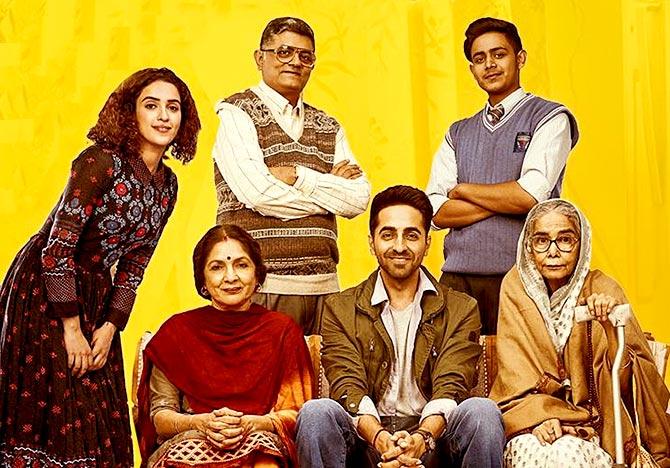The hit parade of well-made movies continues, ticket sales are creeping up and OTTs are upping the game in one of the best years for the film industry, reports Vanita Kohli-Khandekar.

It has been a rocking 2018 for the Indian film industry and the party continues.
Amit Ravindernath Sharma's Badhaai Ho is a rib tickler. The Kaushiks, a couple in their 50s discover they are about to have a child. The reaction this accidental pregnancy gets from their grown up sons, Mr Kaushik's mum, neighbours, friends, relatives is fun to watch.
The consummate Neena Gupta makes for an attractive Mrs Kaushik and Gajraj Rao epitomises Mr Kaushik, a middle class railway employee and diffident husband who loves his wife.
The estimated Rs 300 million production from The Times Group's Junglee Pictures has crossed Rs 730 million globally in the first weekend according to trade publication, Box Office India. It will probably cross the billion rupee mark.
Badhaai Ho comes close on the heels of Sriram Raghavan's thriller Andhadhun (Rs 560 million net box office and counting) also starring Ayushmann Khurrana. The story of a man who pretends to be blind and then witnesses a murder is a very Raghavan film -- with twists and turns that take your breath away.
In August, Amar Kaushik's horror-comedy Stree came out of nowhere to cross Rs 1.15 billion in net box-office revenues.
These films join Raazi, Bharat Ane Nenu, Rangasthalam, Sonu Ke Titu Ki Sweety among other big hits of 2018.
You could argue that after a miserable two years of flopping films and stagnant revenues, India's Rs 156 billion film industry was due for some luck. What is so special about this revival?
"In the last few years, audiences' tastes are changing and that change is now entering into the top 10 charts," says Kumar Ahuja, president, business development, Eros International Media.
Consider Meghna Gulzar's Raazi, so far among the most profitable films of the year.
Alia Bhatt is not a star the trade would bet on for a film where she is the protagonist. But the real story of an Indian girl who married a Pakistani army officer to spy on him during the 1971 war is an outstanding film. And audiences agree. They spent close to Rs 2 billion, globally, buying tickets to watch it.
That is true for many of the top 50 films.
The frequency with which 'content films' are doing well is the first good sign.
'Content film' is industry syntax for interesting, well-made stories, without big stars, which usually don't do well commercially. Of course, some of the 'masala films', with big stars, have also done very well too -- Padmaavat, Sanju, Veere Di Wedding.
Underlying this matching of audience and filmmaker sensibilities is a second sign.
More than two-thirds of the Indian film industry's revenue comes from the sale of tickets or the box-office.
Roughly 1.3 billion tickets were sold in 2017, a figure that has been falling/stagnant for about four years.
While data for 2018 is yet to come in, early reports from single screens and multiplexes indicate that ticket sales are up.
At India's largest multiplex chain, the 711 screen PVR Cinemas, ticket sales went from about 21 million in the first quarter of 2017-2018 to 22.7 million in the same period in 2018-2019.
There is some debate, within trade circles, on whether these are new ticket buyers or old ones who have started watching more films. It doesn't matter -- as long as more tickets are being sold.
Remember this is happening "in the year in which OTTs (over-the-top streaming services) have shown maximum growth," points out Kamal Gianchanadni, CEO, PVR Pictures. If anything, OTT seems to have whetted audiences' appetite for 'content-based' cinema.
That also brings in a worry -- on the content war that OTTs such as Amazon, Netflix and their ilk seem to have set off.
In the early part of the millennium, in a bid to increase viewership, broadcasters bid crazily for film rights. On the back of this rising revenue stream, studios began a land-grab for talent pushing up costs and pushing down margins.
When films bloated with the high-cost of talent started doing badly, it pushed many into a funk. Remember Disney shut down its local production in 2016. That remains a fear.
"The tendency will be to increase supply to meet the demand because there is new money in the market," cautions Ajit Andhare, chief operating officer, Viacom18 Motion Pictures.
That could push a robust recovery into another cycle of gloom.